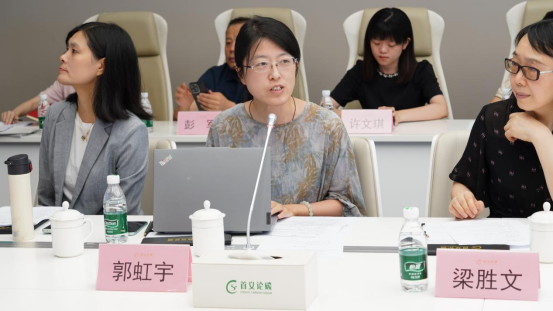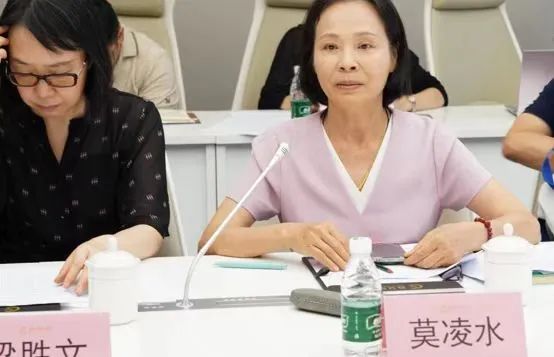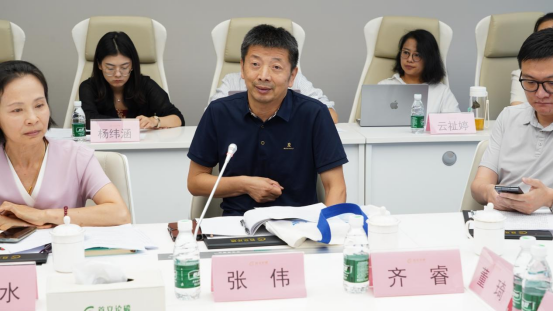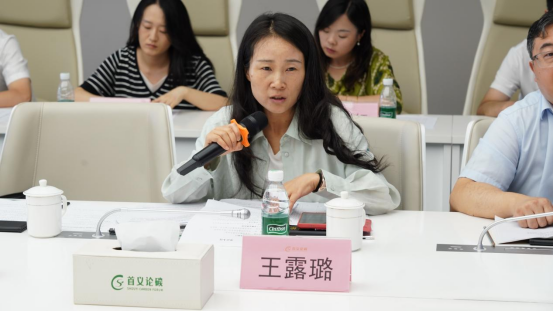On July 15th, the "Wuhan Carbon Connect · Finance Hub" series event – Symposium on Demand for Transition Finance Capacity Building Projects of Wuhan Financial Institutions was held at China Carbon Registry Building in Wuhan. Supported by the Natural Resources Defense Council, the conference was hosted by Beijing Green Research Public Welfare Development Center, undertaken by Wuhan Dual-Carbon Industry Research Institute, and co-organized by Huzhou Green Finance and Sustainable Development Research Institute, as well as Wuhan Carbon Institute's Climate Investment and Financing & Carbon Finance Research Promotion Center. The event brought together representatives from government departments, financial regulatory authorities, financial institutions, enterprises and think tanks to conduct in-depth discussions on the implementation paths and capacity building of transition finance, aiming to explore ways to promote financial resources to accurately serve the green and low-carbon transformation of Wuhan's industries.
The conference was chaired by Cai Guan, Director of the Climate Investment and Financing Promotion Center. Liang Shengwen, Vice President and Chief Expert of Wuhan Dual-Carbon Industry Research Institute, on behalf of the organizer, expressed gratitude to all parties for their support.
At the conference, Guo Hongyu, Deputy Director of Beijing Green Research Public Welfare Development Center, introduced the "Implementation Guidelines and Capacity Improvement for Transition Finance of Financial Institutions in Wuchang Climate Investment and Financing Pilot", which systematically analyzed the background, goals, achievements, challenges and countermeasures of domestic transition finance promotion. Mo Lingshui, Vice President of Huzhou Green Finance and Sustainable Development Research Institute, shared Huzhou's practical experience in green finance, focusing on the coordinated promotion model of institutional standard formulation, organizational structure construction, fiscal and monetary policy incentives, product innovation services, and risk management. Professor Zhang Wei from the School of Economics and Management, China University of Geosciences (Wuhan), emphasized that it is necessary to crack the bottlenecks in the development of green finance through the joint efforts of the government, banks, enterprises and research institutions, so as to support the construction of the Shuangta Lake Dual-Carbon Economic Belt and the climate investment and financing pilot work.



In the exchange and discussion session, the participating representatives focused on the needs and challenges of transition finance implementation and put forward suggestions. The conference pointed out that the current practice still faces common problems such as an imperfect project library system, limited pilot scale, insufficient policy publicity coverage, and high transformation costs for enterprises, which urgently require strengthened policy support and resource integration. Representatives including Wang Lulu, Deputy Director of the Financial Research Department of the People's Bank of China Hubei Branch, suggested that multi-party collaboration should be accelerated to promote the implementation of standards and effectively solve the policy, cost and capacity bottlenecks in enterprise transformation. Wu Qi, Director of the Environmental Law and Governance Project of the Natural Resources Defense Council, proposed that the transformation of high-carbon industries urgently needs diversified and precise financial support, and suggested deepening the collaboration between financial institutions and industrial transformation to innovatively solve financing problems.

Vice President Liang Shengwen delivered a concluding speech. She pointed out that this seminar provided important references for exploring the path of financial transformation and the construction of Wuchang's climate investment and financing pilot. Facing the goal of green and low-carbon economic integration by 2035, it is necessary to focus on promoting three aspects of work: first, plan and layout in advance to seize the strategic opportunities of low-carbon transformation; second, consolidate the data foundation and open up information sharing channels; third, gather the joint efforts of multiple parties, and link government departments, financial institutions, universities and think tanks to jointly solve the financing bottlenecks of small and medium-sized enterprises.
This conference marks that the construction of Wuchang District's climate investment and financing pilot has entered a new stage of systematic promotion. The "Wuhan Carbon Connect · Finance Hub" series of activities will deepen the integration of policies, finance and industries through diversified forms such as policy advocacy, capacity building, project docking, and demonstration leadership, optimize the allocation of financial resources, accelerate the implementation of green and low-carbon transformation projects, comprehensively improve the overall efficiency of regional climate investment and financing, and inject new impetus into Wuhan's green, low-carbon and high-quality development.
More than 30 leaders, experts and representatives attended the seminar, including those from the Municipal Financial Work Office, Municipal Ecological Environment Bureau, Energy Conservation Supervision Center of Municipal Development and Reform Commission, People's Bank of China Hubei Branch, Natural Resources Defense Council, Beijing Green Research Public Welfare Development Center, Huzhou Green Finance and Sustainable Development Research Institute, School of Economics and Management of China University of Geosciences (Wuhan), Wuhan Branch of Minsheng Bank, Wuhan Branch of Huaxia Bank, Wuhan Branch of Industrial Bank, Hanyang Sub-branch of China Merchants Bank, Carbon Emission Rights Registration and Settlement (Wuhan) Co., Ltd., Hubei Carbon Emission Trading Center, China Construction Science and Industry Corporation, Wuhan Organic Industry Co., Ltd., Sinosteel AnHuan Institute, Liantou Qingneng Company, and Wuhan Dual-Carbon Industry Research Institute.


